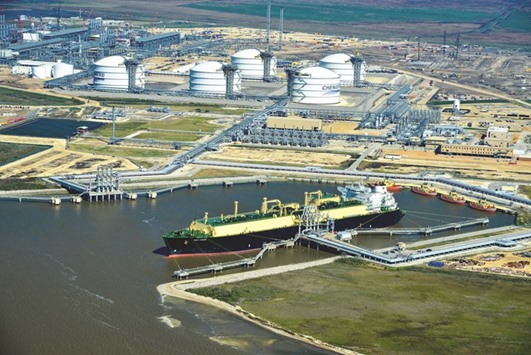The US is set to double the volume of shale natural gas it’s sending abroad.
Cheniere Energy, which became the nation’s first and only exporter of shale gas in February, was cleared by US regulators on Wednesday to start loading tankers with liquefied natural gas from a second plant at its landmark Sabine Pass terminal in Louisiana.
The additional volumes of US LNG will come at a testing time for the global market, which is reeling from a worldwide glut that’s set to worsen through 2020 as demand from key Asian customers slows. Still, the first exports from the lower 48 states have helped whittle down a US surplus of the power-plant fuel and put Cheniere on the road to posting its debut profit.
“There will be big questions about where all of this gas is going to go and what it’s going to do to European gas prices and power prices, in Asia as well,” Ted Michael, an LNG analyst with Genscape, said by phone from Auburn, California. “All of this will be driven by this flood of LNG coming out of Australia and the US primarily.”
Train 2, as the plant is known, began producing LNG on July 28 during the commissioning process. Trains 1 and 2 were shut in late September for planned work, which was expected to last about four weeks. Each has the capacity to produce the equivalent of about 650mn cubic feet a day.
Next year, the company plans to bring online a third plant and start the commissioning of a fourth.
Sabine Pass took in 119bn cubic feet of gas from April 1, which marked the start of the US gas stockpiling season, through September 9, ABB data show. During the same period, the country’s supply glut versus the five-year average fell to 299bn cubic feet from 874bn.
By starting up two liquefaction plants, Cheniere will be able to start taking in fixed payments for 20 years from customers whether or not they decide to actually take any LNG from Sabine Pass. A contract with Royal Dutch Shell goes into effect this December for Train 1, while one with Spain’s Gas Natural Fenosa starts in September 2017, according to a company presentation earlier this year.
Sabine Pass has demonstrated that the plant “can be expected to operate safely as designed,” the energy commission said in approving it for service.

An LNG carrier is docked at Cheniere Energy’s terminal in this aerial photograph taken over Sabine Pass, Texas, US. The additional volumes of LNG will come at a testing time for the global market, which is reeling from a worldwide glut that’s set to worsen through 2020 as demand from key Asian customers slows.
